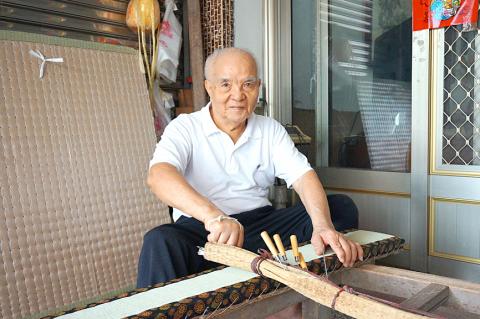Chiu Po (邱波), 85, runs one of two remaining businesses in Chiayi County that insist on weaving tatamis by hand.
Chiu said he left Chiayi’s Meishan Township (梅山) to develop his skills in Jhuci Township (竹崎) when he was 16 years old because of family circumstances.
Chiu opened his own tatami business when he was 26 years old.

Photo: Tseng Nai–chiang, Taipei Times
Jhuci is on the Alishan Forest Railway route, so many Japanese-style hotels opened in the area for lumberjacks and tourists, Chiu said.
Most tatamis at the time were bought by hotels to repair or replace existing ones, he added.
Demand for tatamis sharply decreased in the 1980s with the rise of spring mattresses, Chiu said, adding that Japanese-imported bases made of compressed wood chips or polystyrene foam, which are waterproof and durable, were also introduced.
A tatami has a straw base in the middle layer which is made by placing rice straw horizontally and vertically in five layers to create thickness.
Minhsiung Culture and Education Foundation humanistic photography teacher Wei San-feng (魏三峰) said the smell of rice straw reminds him of his childhood.
Wei, whose students photographed Chiu’s handcraft, said that a tatami is neither too soft or firm and can be laid flat or folded, making it very versatile.
“As long as you put your heart into the work and insist on quality, you do not have to worry about customers not returning,” Chiu said.
Cheng Shun-hsing (鄭順興), 61, retired from his job as a physical therapist at Puzi Hospital two years ago and inherited his father’s tatami business in Puzi City (朴子).
Echoing Chiu, Cheng said the majority of tatami mats are sold to families rather than hotels.
Cheng said he has developed pillows, support pillows, coasters and other products.
The exterior of the pillow is made with foam while the middle layer is rice straw, Cheng said, adding that body heat is released through the straw making the pillows breathable.
Years of squatting to weave tatami have caused pain in Chiu’s lower back and hands, he said, adding that he has undergone cataract surgery, but he is unwilling to retire and regrets that there is no one to inherit the craft.
Cheng also wishes to pass on his skills and has taught people how to make tatami at community centers in Lioujiao Township’s (六腳) Wanbei Village (灣北) and Puzi City’s Shuntian Village (順天).
Wei said that a photography exhibition at the Chiayi District Prosecutors’ Office in March next year would show the process of tatami making.

A strong continental cold air mass is to bring pollutants to Taiwan from tomorrow, the Ministry of Environment said today, as it issued an “orange” air quality alert for most of the country. All of Taiwan except for Hualien and Taitung counties is to be under an “orange” air quality alert tomorrow, indicating air quality that is unhealthy for sensitive groups. In China, areas from Shandong to Shanghai have been enveloped in haze since Saturday, the ministry said in a news release. Yesterday, hourly concentrations of PM2.5 in these areas ranged from 65 to 160 micrograms per cubic meter (mg/m³), and pollutants were

Taiwan’s armed forces have established response protocols for a wide range of sudden contingencies, including the “Wan Chun Plan” to protect the head of state, the Ministry of Defense (MND) said today. After US President Donald Trump on Saturday launched a series of airstrikes in Venezuela and kidnapped Venezuelan President Nicolas Maduro, concerns have been raised as to whether China would launch a similar “decapitation strike” on Taiwan. The armed forces regularly coordinate with relevant agencies and practice drills to ensure preparedness for a wide range of scenarios, Vice Minister of National Defense Hsu Szu-chien (徐斯儉) told reporters before a

EVA Airways on Saturday said that it had suspended a pilot and opened an investigation after he allegedly lost his temper and punched the first officer several times as their plane was taxiing before takeoff at Los Angeles International Airport. According to a report published on Thursday by The Reporter, the incident occurred after the flight’s Malaysian first officer tried to warn the Taiwanese pilot, surnamed Wen (文), that he was taxiing faster than the speed limit of 30 knots (55.6kph). After alerting the pilot several times without response, the first officer manually applied the brakes in accordance with standard operating

Japanese Councilor Hei Seki (石平) on Wednesday said that he plans to visit Taiwan, saying that would “prove that Taiwan is an independent country and does not belong to China.” Seki, a member of the Japan Innovation Party, was born in Chengdu in China’s Sichuan Province and became a naturalized Japanese in 2007. He was elected to the House of Concilors last year. His views on the Chinese Communist Party (CCP) — espoused in a series of books on politics and history — prompted Beijing to sanction him, including barring Seki from traveling to China. Seki wrote on X that he intends